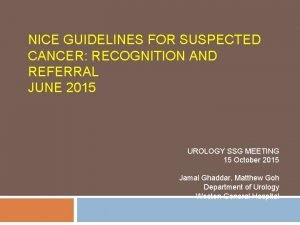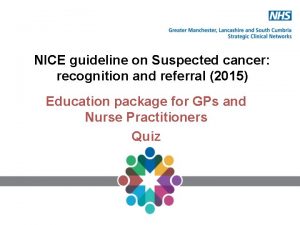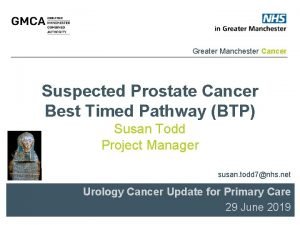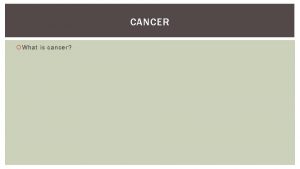How to manage suspected cancer Sarah Slater Model








- Slides: 8

How to manage suspected cancer Sarah Slater

Model of Care Ø Setting out 104 recommendations across 13 care pathways, the Model of Care’s key recommendations were to: Ø Help diagnose cancer earlier : Late diagnosis of cancers with many cancers diagnosed at a late stage when successful treatment is less likely; Ø Improve patient care and reduce inequalities in access to and uptake of services Ø Improve patient outcomes Ø Improve patient experience.

Hence development of fast track referrals Ø Pathways for Upper GI/ Urology/ Haem Oncology/ Bone and Sarcoma/ Brain/ Ovary/ Lung/Skin/Breast Ø Some patients don’t fit into these pathways.

What to do for suspected cancer Ø My role=Lead for CUP Ø Peer review measure for Acute Oncology Ø Fast track pts with suspicious imaging: lung nodules; bone lesions. Ø Lead on appropiate next steps

MUO Ø 15% cancer diagnoses present as metastases Ø In 2/3, will find the primary. Ø For the rest (5%)=provisional CUP Ø Most common sites- pancreas and lung, then colon, stomach, oesophagus, ovary, prostate, breast

Clinical management of patients presenting with CUPs. Fizazi K et al. Ann Oncol 2011; 22: vi 64 -vi 68

Recommendation • Offer the following investigations to patients with MUO, as clinically appropriate, guided by the patient’s symptoms: − comprehensive history and physical examination including breast, nodal areas, skin, genital, rectal and pelvic examination − full blood count; urea, electrolytes and creatinine; liver function tests; calcium; urinalysis; lactate dehydrogenase

Section 3 CLINICAL INFORMATION THERE MUST BE IMAGING SUGGESTIVE OF METASTATIC DISEASE BEFORE ANY REFERRAL USING THIS FORM, AND PLEASE SEND REPORT. *If patient has a history of cancer please consider whether this is more likely to be a recurrence than a true unknown primary cancer. Patients with suspected recurrence should be referred back to the site specific team. [ ] USS: Specify site ______________ [ ] CT scan: Specify site _____________ [ ] MRI: Specify site _____________ Symptoms accompanying suspected cancer imaging eg [ ] Progressive unintentional weight loss [ ] anorexia [ ] Pain: Specify site ____________ [ ] other: ________________________________ ________________________________ Examination findings and blood tests if the latter performed. Specify site: ________________________________















